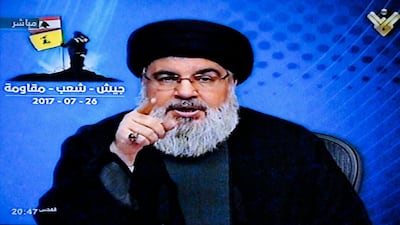Hezbollah’s leader said on Tuesday his movement welcomed France’s efforts to help Lebanon out of crisis, but that did not mean the French President Emmanuel Macron could act like the country’s ruler.
In a televised address, Hassan Nasrallah said his heavily armed, Iran-backed group remained ready for dialogue under the French roadmap to pull the nation out of financial meltdown.
But he criticised what he called “patronising behaviour”.
Mr Macron has led foreign aid efforts for his country’s former protectorate and criticised Lebanese sectarian leaders for failing to swiftly agree on a new government.
It was the first step in the French plan to rally them to introduce reforms that could unlock billions of foreign aid dollars, cash Lebanon desperately needs.
Mr Macron said he was “ashamed” of Lebanese politicians and deemed it a betrayal as his initiative faltered.
He gave Lebanon’s politicians four to six weeks to implement his road map and pledged to hold a donor conference for Lebanon in October.
Mr Macron criticised Lebanon’s two main Shiite parties, Hezbollah and its ally the Amal Movement, whose demand to retain their hold on ministries, especially finance, was at the heart of the impasse.
“Who says it’s a betrayal?” Mr Nasrallah retorted on Tuesday. “We did not commit to agreeing a government in any shape or form.”
“We welcomed President Macron when he visited Lebanon and we welcomed the French initiative, but not for him to be judge, jury and executioner – and ruler of Lebanon.”
He accused Sunni leader Saad Al Hariri, along with other former prime ministers, of pulling the strings in an attempt to exploit the French intervention for political points.
Mr Nasrallah blamed them for seeking to sideline Hezbollah and its allies, which hold a majority in Parliament.
Prime minister-designate Mustapha Adib resigned at the weekend after he was unable to form a government.
The crisis, Lebanon’s worst since its 1975-1990 civil war, has pushed it to breaking point and deeper into an existing economic crisis.
Mr Macron has visited the country twice since the huge blast at Beirut’s port in August, which killed at least 190 people, ravaged the capital and prompted the government to resign.
Thousands were wounded, and the disaster sparked new protests against government corruption and mismanagement.
Amal, which chose the last finance minister, said earlier that it respected Mr Macron’s role but was surprised by his comments holding it responsible for the deadlock.

